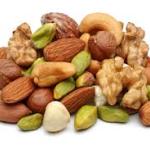OK, before jumping in, the work was supported by BIG Potato. To be fair, additional funding came from BIG Walnut and BIG Almond – you may judge the study as you wish.
nuts
Using data from 3 large prospective epidemiological studies, the Nurses' Health Study, the Nurses' Health Study II, and the Health Professionals Follow-up Study, investigator looked at the possible associations between consumption of peanuts and t
In health news: Plain ole water is getting a makeover new, but not necessarily improved, could nuts be the new powerhouse foods? Some think so, and the world lights it up blue for World Autism Awareness Day.
Eating peanuts (which are actually legumes) was associated with a lower risk for cardiovascular disease and death, acco
Jane Brody, the widely-read New York Times health writer, has




